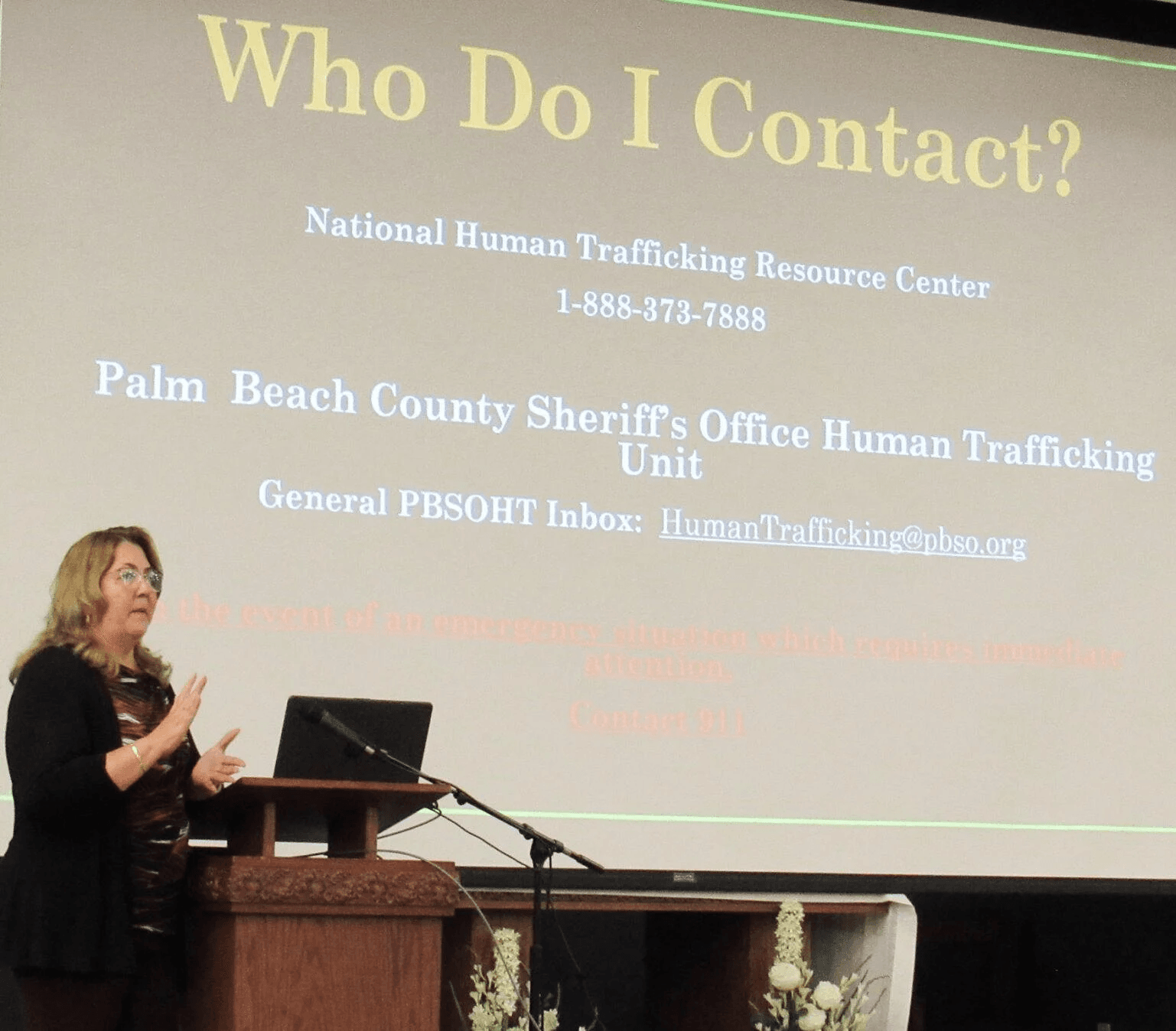
PALM BEACH GARDENS | Since Florida is ranked third in the nation for human trafficking and Palm Beach County is third in the state for suspected cases, it is well documented that people are being victimized in the area. Catholic Charities and its Bakhita Empowerment Program are tackling the problem in partnership with the Palm Beach County Sheriff’s Office.
To assist all Catholic Charities staff to recognize human trafficking, a presentation was held June 11 in the Cathedral of St. Ignatius Loyola’s Family Life Center. The main speaker was PBSO Sgt. Carlos Lisboa, who works with the Palm Beach County Human Trafficking Task Force and Catholic Charities to stop this modern-day scourge.
According to the sheriff office’s website, human trafficking is defined as transporting, soliciting, recruiting, harboring, providing, enticing, maintaining or obtaining another person for the purpose of exploiting that person for either commercial sex activity, labor or services. Because of the nature of the crime, victims of human trafficking can be encountered in every corner of society, from the poorest to the wealthiest.
The main goal of the Bakhita Empowerment Program is to help victims of human trafficking become self-sufficient after they have been rescued by law enforcement, said Sandra Perez, administrator of the program, who has worked with Lisboa since 2017.
“We provide long-term, sometimes short-term, services,” she said. “Long-term case management because PBSO provides crisis intervention most of the time. As Lisboa told you, it overlaps all the time, crisis intervention and case management, because most of the victims relapse or they are not ready to receive or engage in long-term services. They are still dependent on traffickers. So, it’s a complicated process, but we provide counseling, we cover all their essential needs like housing, food, clothing. All the needs that they have at the moment.”
Carol Rodriguez, program development and quality director for Catholic Charities, said it’s hoped that the knowledge gained by the agency’s staff will help them recognize local victims of human trafficking.
“Catholic Charities works with the poor and vulnerable. These are direct-service staff people, who work with vulnerable populations that are at high risk for human trafficking,” she said. “Even though we have a program that really has the expertise in human trafficking, we have all these other programs that need to really understand the signs, how to recognize it and what to do if they see something suspicious.”
Perez encouraged her Catholic Charities colleagues to contact the Bakhita office if one of their clients appears to be a trafficking victim.
INDICATORS OF HUMAN TRAFFICKING
• Is the person free to leave, come and go as they wish?
• Is the person unpaid, paid very little or paid only through tips?
• Does the person work excessively long and/or with unusual hours?
• Is the person not allowed breaks or suffers under unusual restrictions at work?
• Does the person owe a large debt and is unable to pay it off?
• Does the person live at their place of employment?
• Was the person recruited under false promises concerning the nature and conditions of their work?
• Is the person in the commercial sex industry, and do they have a pimp/manager?
• Is the person under the age of 18 and providing commercial sex acts?
• Is the person in control or possession of their personal identification, travel documents, money, financial records, bank account?
• Does the person avoid eye contact?
To learn more about the Bakhita Empowerment Program, visit www.ccdpb.org/programs/anti-human-trafficking/, email Perez at sperez@ccdpb.org or call 561-345-2008. For information on the Palm Beach County Human Trafficking Task Force, go to www.pbso.org/human-trafficking.
Contact the Palm Beach County Sheriff’s Office Human Trafficking Unit at 561-687-6838; the National Human Trafficking Resource Center at 888-373-7888; or text the BeFree textline at BeFree (233733).

